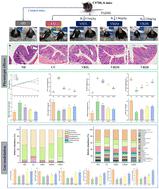当前位置:
X-MOL 学术
›
Food Funct.
›
论文详情
Our official English website, www.x-mol.net, welcomes your feedback! (Note: you will need to create a separate account there.)
Riboflavin ameliorates intestinal inflammation via immune modulation and alterations of gut microbiota homeostasis in DSS-colitis C57BL/6 mice
Food & Function ( IF 6.1 ) Pub Date : 2024-03-26 , DOI: 10.1039/d4fo00835a Wang-Wei Zhang 1 , Kiran Thakur 1, 2 , Jian-Guo Zhang 1, 2 , Zhao-Jun Wei 1, 2
Food & Function ( IF 6.1 ) Pub Date : 2024-03-26 , DOI: 10.1039/d4fo00835a Wang-Wei Zhang 1 , Kiran Thakur 1, 2 , Jian-Guo Zhang 1, 2 , Zhao-Jun Wei 1, 2
Affiliation

|
While there have been advancements in understanding the direct and indirect impact of riboflavin (B2) on intestinal inflammation, the precise mechanisms are still unknown. This study focuses on evaluating the effects of riboflavin (B2) supplementation on a colitis mouse model induced with 3% dextran sodium sulphate (DSS). We administered three different doses of oral B2 (VB2L, VB2M, and VB2H) and assessed its impact on various physiological and biochemical parameters associated with colitis. Mice given any of the three doses exhibited relative improvement in the symptoms and intestinal damage. This was evidenced by the inhibition of the pro-inflammatory cytokines TNF-α, IL-1β, and CALP, along with an increase in the anti-inflammatory cytokine IL-10. B2 supplementation also led to a restoration of oxidative homeostasis, as indicated by a decrease in myeloperoxidase (MPO) and malondialdehyde (MDA) levels and an increase in reduced glutathione (GSH) and catalase (CAT) activities. B2 intervention showed positive effects on intestinal barrier function, confirmed by increased expression of tight junction proteins (occludin and ZO-1). B2 was linked to an elevated relative abundance of Actinobacteriota, Desulfobacterota, and Verrucomicrobiota. Notably, Verrucomicrobiota showed a significant increase in the VB2H group, reaching 15.03% relative abundance. Akkermansia exhibited a negative correlation with colitis and might be linked to anti-inflammatory function. Additionally, a remarkable increase in n-butyric acid, i-butyric acid, and i-valeric acid was reported in the VB2H group. The ameliorating role of B2 in gut inflammation can be attributed to immune system modulation as well as alterations in the gut microbiota composition, along with elevated levels of fecal SCFAs.
中文翻译:

核黄素通过免疫调节和改变 DSS 结肠炎 C57BL/6 小鼠肠道微生物群稳态来改善肠道炎症
虽然核黄素 (B 2 ) 对肠道炎症的直接和间接影响的理解已取得进展,但其确切机制仍不清楚。本研究重点评估补充核黄素 (B 2 ) 对 3% 右旋糖酐硫酸钠 (DSS) 诱导的结肠炎小鼠模型的影响。我们给予三种不同剂量的口服 B 2(VB2L、VB2M 和 VB2H),并评估其对与结肠炎相关的各种生理和生化参数的影响。接受三种剂量中任何一种的小鼠的症状和肠道损伤均表现出相对改善。促炎细胞因子 TNF-α、IL-1β 和 CALP 的抑制以及抗炎细胞因子 IL-10 的增加证明了这一点。补充B 2还可以恢复氧化稳态,表现为髓过氧化物酶 (MPO) 和丙二醛 (MDA) 水平降低以及还原型谷胱甘肽 (GSH) 和过氧化氢酶 (CAT) 活性增加。 B 2干预对肠道屏障功能显示出积极影响,紧密连接蛋白(occludin 和 ZO-1)表达增加证实了这一点。 B 2与放线菌门、脱硫菌门和疣微菌门的相对丰度升高有关。值得注意的是,疣微生物群在VB2H组中表现出显着增加,相对丰度达到15.03%。阿克曼氏菌与结肠炎呈负相关,并可能与抗炎功能有关。此外,VB2H 组中正丁酸、异丁酸和异戊酸显着增加。 B 2在肠道炎症中的改善作用可归因于免疫系统调节以及肠道微生物群组成的改变,以及粪便 SCFA 水平的升高。
更新日期:2024-03-26
中文翻译:

核黄素通过免疫调节和改变 DSS 结肠炎 C57BL/6 小鼠肠道微生物群稳态来改善肠道炎症
虽然核黄素 (B 2 ) 对肠道炎症的直接和间接影响的理解已取得进展,但其确切机制仍不清楚。本研究重点评估补充核黄素 (B 2 ) 对 3% 右旋糖酐硫酸钠 (DSS) 诱导的结肠炎小鼠模型的影响。我们给予三种不同剂量的口服 B 2(VB2L、VB2M 和 VB2H),并评估其对与结肠炎相关的各种生理和生化参数的影响。接受三种剂量中任何一种的小鼠的症状和肠道损伤均表现出相对改善。促炎细胞因子 TNF-α、IL-1β 和 CALP 的抑制以及抗炎细胞因子 IL-10 的增加证明了这一点。补充B 2还可以恢复氧化稳态,表现为髓过氧化物酶 (MPO) 和丙二醛 (MDA) 水平降低以及还原型谷胱甘肽 (GSH) 和过氧化氢酶 (CAT) 活性增加。 B 2干预对肠道屏障功能显示出积极影响,紧密连接蛋白(occludin 和 ZO-1)表达增加证实了这一点。 B 2与放线菌门、脱硫菌门和疣微菌门的相对丰度升高有关。值得注意的是,疣微生物群在VB2H组中表现出显着增加,相对丰度达到15.03%。阿克曼氏菌与结肠炎呈负相关,并可能与抗炎功能有关。此外,VB2H 组中正丁酸、异丁酸和异戊酸显着增加。 B 2在肠道炎症中的改善作用可归因于免疫系统调节以及肠道微生物群组成的改变,以及粪便 SCFA 水平的升高。



























 京公网安备 11010802027423号
京公网安备 11010802027423号